美国总统罗斯福英语介绍
- 格式:ppt
- 大小:443.00 KB
- 文档页数:11
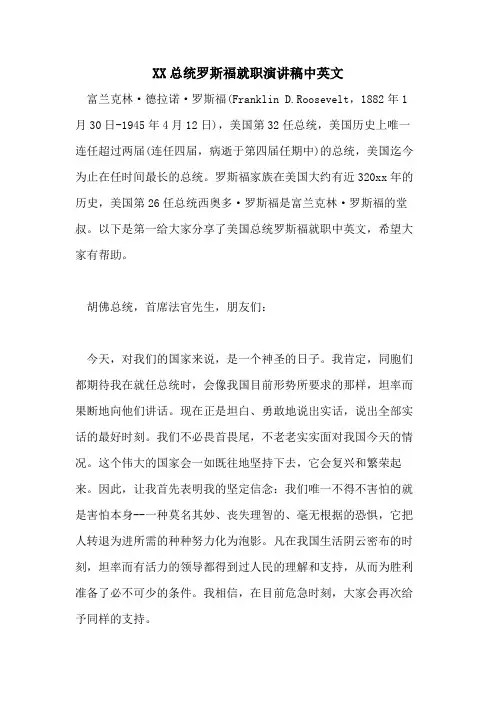
XX总统罗斯福就职演讲稿中英文富兰克林·德拉诺·罗斯福(Franklin D.Roosevelt,1882年1月30日-1945年4月12日),美国第32任总统,美国历史上唯一连任超过两届(连任四届,病逝于第四届任期中)的总统,美国迄今为止在任时间最长的总统。
罗斯福家族在美国大约有近320xx年的历史,美国第26任总统西奥多·罗斯福是富兰克林·罗斯福的堂叔。
以下是第一给大家分享了美国总统罗斯福就职中英文,希望大家有帮助。
胡佛总统,首席法官先生,朋友们:今天,对我们的国家来说,是一个神圣的日子。
我肯定,同胞们都期待我在就任总统时,会像我国目前形势所要求的那样,坦率而果断地向他们讲话。
现在正是坦白、勇敢地说出实话,说出全部实话的最好时刻。
我们不必畏首畏尾,不老老实实面对我国今天的情况。
这个伟大的国家会一如既往地坚持下去,它会复兴和繁荣起来。
因此,让我首先表明我的坚定信念:我们唯一不得不害怕的就是害怕本身--一种莫名其妙、丧失理智的、毫无根据的恐惧,它把人转退为进所需的种种努力化为泡影。
凡在我国生活阴云密布的时刻,坦率而有活力的领导都得到过人民的理解和支持,从而为胜利准备了必不可少的条件。
我相信,在目前危急时刻,大家会再次给予同样的支持。
我和你们都要以这种精神,来面对我们共同的困难。
感谢上帝,这些困难只是物质方面的。
价值难以想象地贬缩了;课税增加了;我们的支付能力下降了;各级政府面临着严重的收入短缺;交换手段在贸易过程中遭到了冻结;工业企业枯萎的落叶到处可见;农场主的产品找不到销路;千家万户多年的积蓄付之东流。
更重要的是,大批失业公民正面临严峻的生存问题,还有大批公民正以艰辛的劳动换取微薄的报酬。
只有愚蠢的乐天派会否认当前这些阴暗的现实。
但是,我们的苦恼决不是因为缺乏物资。
我们没有遭到什么蝗虫的灾害。
我们的先辈曾以信念和无畏一次次转危为安,比起他们经历过的险阻,我们仍大可感到欣慰。
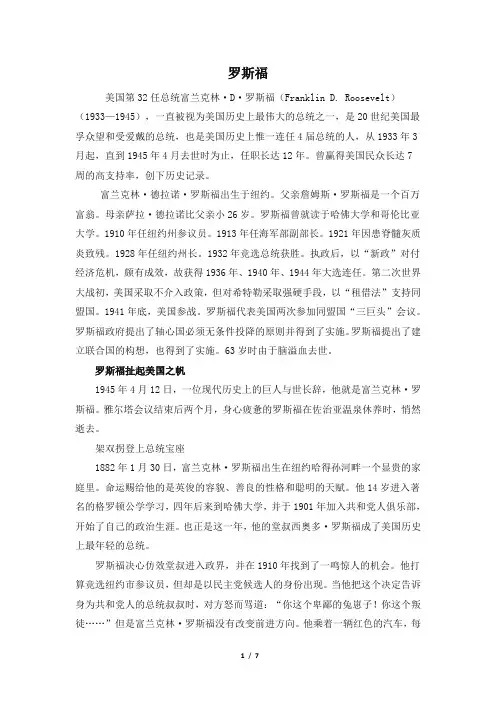
罗斯福美国第32任总统富兰克林·D·罗斯福(Franklin D. Roosevelt)(1933—1945),一直被视为美国历史上最伟大的总统之一,是20世纪美国最孚众望和受爱戴的总统,也是美国历史上惟一连任4届总统的人,从1933年3月起,直到1945年4月去世时为止,任职长达12年。
曾赢得美国民众长达7周的高支持率,创下历史记录。
富兰克林·德拉诺·罗斯福出生于纽约。
父亲詹姆斯·罗斯福是一个百万富翁。
母亲萨拉·德拉诺比父亲小26岁。
罗斯福曾就读于哈佛大学和哥伦比亚大学。
1910年任纽约州参议员。
1913年任海军部副部长。
1921年因患脊髓灰质炎致残。
1928年任纽约州长。
1932年竞选总统获胜。
执政后,以“新政”对付经济危机,颇有成效,故获得1936年、1940年、1944年大选连任。
第二次世界大战初,美国采取不介入政策,但对希特勒采取强硬手段,以“租借法”支持同盟国。
1941年底,美国参战。
罗斯福代表美国两次参加同盟国“三巨头”会议。
罗斯福政府提出了轴心国必须无条件投降的原则并得到了实施。
罗斯福提出了建立联合国的构想,也得到了实施。
63岁时由于脑溢血去世。
罗斯福扯起美国之帆1945年4月12日,一位现代历史上的巨人与世长辞,他就是富兰克林·罗斯福。
雅尔塔会议结束后两个月,身心疲惫的罗斯福在佐治亚温泉休养时,悄然逝去。
架双拐登上总统宝座1882年1月30日,富兰克林·罗斯福出生在纽约哈得孙河畔一个显贵的家庭里。
命运赐给他的是英俊的容貌、善良的性格和聪明的天赋。
他14岁进入著名的格罗顿公学学习,四年后来到哈佛大学,并于1901年加入共和党人俱乐部,开始了自己的政治生涯。
也正是这一年,他的堂叔西奥多·罗斯福成了美国历史上最年轻的总统。
罗斯福决心仿效堂叔进入政界,并在1910年找到了一鸣惊人的机会。
他打算竞选纽约市参议员,但却是以民主党候选人的身份出现。
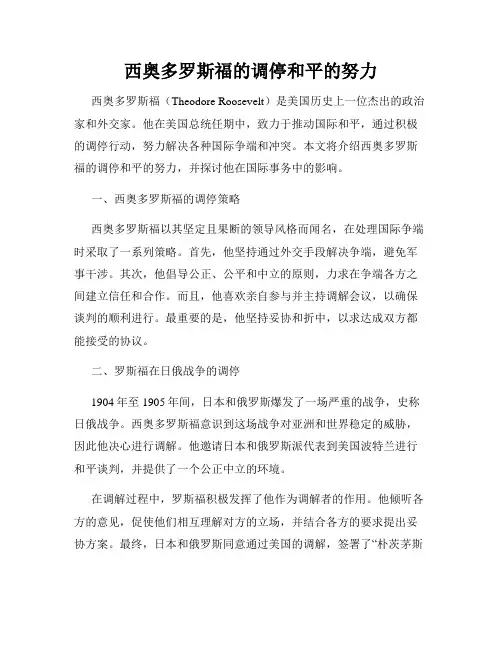
西奥多罗斯福的调停和平的努力西奥多罗斯福(Theodore Roosevelt)是美国历史上一位杰出的政治家和外交家。
他在美国总统任期中,致力于推动国际和平,通过积极的调停行动,努力解决各种国际争端和冲突。
本文将介绍西奥多罗斯福的调停和平的努力,并探讨他在国际事务中的影响。
一、西奥多罗斯福的调停策略西奥多罗斯福以其坚定且果断的领导风格而闻名,在处理国际争端时采取了一系列策略。
首先,他坚持通过外交手段解决争端,避免军事干涉。
其次,他倡导公正、公平和中立的原则,力求在争端各方之间建立信任和合作。
而且,他喜欢亲自参与并主持调解会议,以确保谈判的顺利进行。
最重要的是,他坚持妥协和折中,以求达成双方都能接受的协议。
二、罗斯福在日俄战争的调停1904年至1905年间,日本和俄罗斯爆发了一场严重的战争,史称日俄战争。
西奥多罗斯福意识到这场战争对亚洲和世界稳定的威胁,因此他决心进行调解。
他邀请日本和俄罗斯派代表到美国波特兰进行和平谈判,并提供了一个公正中立的环境。
在调解过程中,罗斯福积极发挥了他作为调解者的作用。
他倾听各方的意见,促使他们相互理解对方的立场,并结合各方的要求提出妥协方案。
最终,日本和俄罗斯同意通过美国的调解,签署了“朴茨茅斯和约”,结束了战争。
罗斯福因此成为第一个获得诺贝尔和平奖的美国总统。
三、罗斯福在巴拿马运河问题上的调停早期,法国尝试在巴拿马地区建设运河,但由于种种困难而失败。
西奥多罗斯福执政期间,美国决定接手巴拿马运河项目。
然而,哥伦比亚政府对于签署相应协议存在纷争。
西奥多罗斯福决定采取行动,为解决这一问题,推动了巴拿马独立运动,并通过与独立后的巴拿马政府签署《哈约-布恩契维利亚条约》,确保了巴拿马区域的旅行和运输的自由。
四、罗斯福在摩洛哥危机的调停1905年至1906年,法国和德国之间爆发了一场以摩洛哥为中心的危机,引发了欧洲的紧张局势。
西奥多罗斯福意识到这一危机的严重性,他邀请法国和德国的代表来美国,以就摩洛哥问题进行调解。
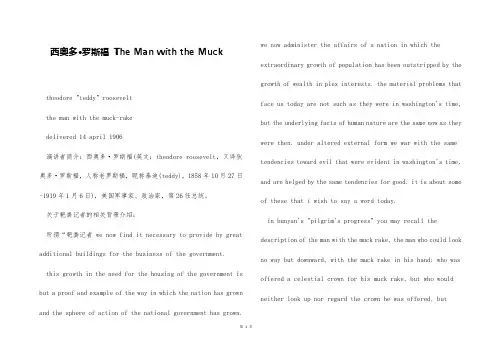
西奥多·罗斯福The Man with the Mucktheodore "teddy" rooseveltthe man with the muck-rakedelivered 14 april 1906演讲者简介:西奥多·罗斯福(英文:theodore roosevelt,又译狄奥多·罗斯福,人称老罗斯福,昵称泰迪(teddy),1858年10月27日-1919年1月6日),美国军事家、政治家,第26任总统。
关于耙粪记者的相关背景介绍:所谓“耙粪记者 we now find it necessary to provide by great additional buildings for the business of the government.this growth in the need for the housing of the government is but a proof and example of the way in which the nation has grown and the sphere of action of the national government has grown. we now administer the affairs of a nation in which the extraordinary growth of population has been outstripped by the growth of wealth in plex interests. the material problems that face us today are not such as they were in washington's time, but the underlying facts of human nature are the same now as they were then. under altered external form we war with the same tendencies toward evil that were evident in washington's time, and are helped by the same tendencies for good. it is about some of these that i wish to say a word today.in bunyan's "pilgrim's progress" you may recall the description of the man with the muck rake, the man who could look no way but downward, with the muck rake in his hand; who was offered a celestial crown for his muck rake, but who would neither look up nor regard the crown he was offered, butcontinued to rake to himself the filth of the floor.in "pilgrim's progress" the man with the muck rake is set forth as the example of him whose vision is fixed on carnal instead of spiritual things. yet he also typifies the man who in this life consistently refuses to see aught that is lofty, and fixes his eyes with solemn intentness only on that which is vile and debasing.now, it is very necessary that we should not flinch from seeing what is vile and debasing. there is filth on the floor, and it must be scraped up with the muck rake; and there are times and places where this service is the most needed of all the services that can be performed. but the man who never does anything else, who never thinks or speaks or writes, save of his feats with the muck rake, speedily bees, not a help but one of the most potent forces for evil.there are in the body politic, economic and social, many and grave evils, and there is urgent necessity for the sternest war upon them. there should be relentless exposure of and attack upon every evil man, whether politician or business man, every evil practice, whether in politics, business, or social life. i hail as a benefactor every writer or speaker, every man who, on the platform or in a book, magazine, or newspaper, with merciless severity makes such attack, provided always that he in his turn remembers that the attack is of use only if it is absolutely truthful.the liar is no whit better than the thief, and if his mendacity takes the form of slander he may be worse than most thieves. itputs a premium upon knavery untruthfully to attack an honest man, or even with hysterical exaggeration to assail a bad man with untruth.an epidemic of indiscriminate assault upon character does no good, but very great harm. the soul of every scoundrel is gladdened whenever an honest man is assailed, or even when a scoundrel is untruthfully assailed.now, it is easy to twist out of shape what i have just said, easy to affect to misunderstand it, and if it is slurred over in repetition not difficult really to misunderstand it. some persons are sincerely incapable of understanding that to denounce mud slinging does not mean the endorsement of whitewashing; and both the interested individuals who need whitewashing and those others who practice mud slinging like to encourage such confusion of ideas.one of the chief counts against those who make indiscriminate assault upon men in business or men in public life is that they invite a reaction which is sure to tell powerfully in favor of the unscrupulous scoundrel who really ought to be attacked, who ought to be exposed, who ought, if possible, to be put in the penitentiary. if aristides is praised overmuch as just, people get tired of hearing it; and over-censure of the unjust finally and from similar reasons results in their favor.any excess is almost sure to invite a reaction; and, unfortunately, the reactions instead of taking the form of punishment of those guilty of the excess, is apt to take the form either of punishment of the unoffending or of giving immunity, and even strength, to offenders. the effort to make financialor political profit out of the destruction of character can only result in public calamity. gross and reckless assaults on character, whether on the stump or in newspaper, magazine, or book, create a morbid and vicious public sentiment, and at the same time act as a profound deterrent to able men of normal sensitiveness and tend to prevent them from entering the public service at any price.as an instance in point, i may mention that one serious difficulty encountered in getting the right type of men to dig the panama canal is the certainty that they will be exposed, both without, and, i am sorry to say, sometimes within, congress, toutterly reckless assaults on their character and capacity.at the risk of repetition let me say again that my plea is notfor immunity to, but for the most unsparing exposure of, the politician who betrays his trust, of the big business man who makes or spends his fortune in illegitimate or corrupt ways. there should be a resolute effort to hunt every such man out of the position he has disgraced. expose the crime, and hunt down the criminal; but remember that even in the case of crime, if it is attacked in sensational, lurid, and untruthful fashion, the attack may do more damage to the public mind than the crime itself.it is because i feel that there should be no rest in the endless war against the forces of evil that i ask the war be conductedwith sanity as well as with resolution. the men with the muck rakes are often indispensable to the well being of society; but only if they know when to stop raking the muck, and to look upwardto the celestial crown above them, to the crown of worthy endeavor. there are beautiful things above and round about them; and if they gradually grow to feel that the whole world is nothing but muck, their power of usefulness is gone.if the whole picture is painted black there remains no hue whereby to single out the rascals for distinction from their fellows. such painting finally induces a kind of moral color blindness; and people affected by it e to the conclusion that no man is really black, and no man really white, but they are all gray.in other words, they neither believe in the truth of the attack, nor in the honesty of the man who is attacked; they grow as suspicious of the accusation as of the offense; it bees well nigh hopeless to stir them either to wrath against wrongdoing or to enthusiasm for what is right; and such a mental attitude in the public gives hope to every knave, and is the despair of honest men. to assail the great and admitted evils of our political and industrial life with such crude and sweeping generalizations as to include decent men in the general condemnation means the searing of the public con science. there results a general attitude either of cynical belief in and indifference to public corruption or else of a distrustful inability to discriminate between the good and the bad. either attitude is fraught with untold damage to the country as a whole.the fool who has not sense to discriminate between what is good and what is bad is well nigh as dangerous as the man who does discriminate and yet chooses the bad. there is nothing more distressing to every good patriot, to every good american, thanthe hard, scoffing spirit which treats the allegation ofdishonesty in a public man as a cause for laughter. such laughter is worse than the crackling of thorns under a pot, for it denotes not merely the vacant mind, but the heart in which high emotions have been choked before they could grow to fruition. there is any amount of good in the world, and there never was a time when loftier and more disinterested work for the betterment of mankind was being done than now. the forces that tend for evil are great and terrible, but the forces of truth and love and courage and honesty and generosity and sympathy are also stronger than ever before. it is a foolish and timid, no less than a wicked thing, to blink the fact that the forces of evil are strong, but it is even worse to fail to take into account the strength of the forces that tell for good. hysterical sensationalism is the poorest weapon wherewith to fight for lasting righteousness. the men who with stern sobriety and truth assail the many evils of our time, whether in the public press, or in magazines, or in books, are the leaders and allies of all engaged in the work for social and political betterment. but if they give good reason for distrust of what they say, if they chill the ardor of those who demand truth as a primary virtue, they thereby betray the good cause and play into the hands of the very men against whom they are nominally at war.in his ecclesiastical polity that fine old elizabethan divine, bishop hooker, wrote:he that goeth about to persuade a multitude that they are not so well governed as they ought to be shall never want attentiveand favorable hearers, because they know the manifold defects whereunto every kind of regimen is subject, but the secret lets and difficulties, which in public proceedings are innumerable and inevitable, they have not ordinarily the judgment to consider.。
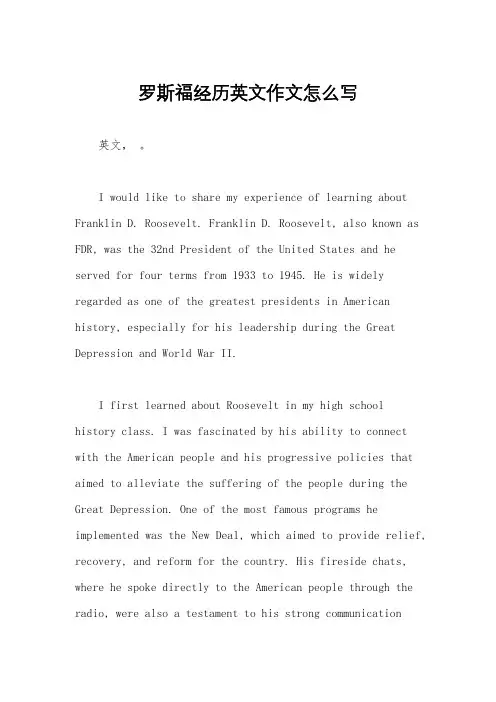
罗斯福经历英文作文怎么写英文,。
I would like to share my experience of learning about Franklin D. Roosevelt. Franklin D. Roosevelt, also known as FDR, was the 32nd President of the United States and he served for four terms from 1933 to 1945. He is widely regarded as one of the greatest presidents in American history, especially for his leadership during the Great Depression and World War II.I first learned about Roosevelt in my high schoolhistory class. I was fascinated by his ability to connect with the American people and his progressive policies that aimed to alleviate the suffering of the people during the Great Depression. One of the most famous programs he implemented was the New Deal, which aimed to provide relief, recovery, and reform for the country. His fireside chats, where he spoke directly to the American people through the radio, were also a testament to his strong communicationskills and his ability to inspire hope during difficult times.As I delved deeper into Roosevelt's presidency, I was impressed by his resilience and determination in the face of adversity. Despite being diagnosed with polio and being paralyzed from the waist down, he did not let his physical limitations hinder his ability to lead the country. His famous quote, "The only thing we have to fear is fear itself," has always resonated with me and serves as a reminder to remain strong in the face of challenges.Roosevelt's leadership during World War II was also remarkable. He guided the United States through one of the most tumultuous periods in world history and played a pivotal role in shaping the post-war world order. Hisvision for a world based on democratic principles and international cooperation laid the foundation for the United Nations and other global institutions that promote peace and security.Overall, learning about Roosevelt's life and presidencyhas been incredibly inspiring for me. His ability toconnect with people, his resilience in the face of adversity, and his vision for a better world serve as a constant source of motivation for me in my own life.中文:我想分享一下我对富兰克林·罗斯福的了解。
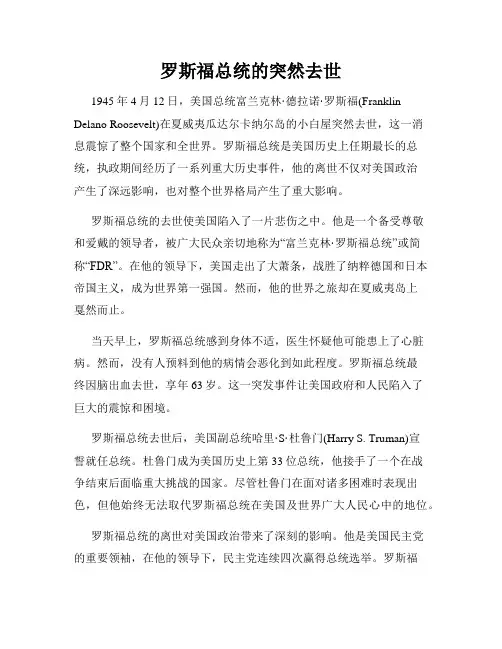
罗斯福总统的突然去世1945年4月12日,美国总统富兰克林·德拉诺·罗斯福(Franklin Delano Roosevelt)在夏威夷瓜达尔卡纳尔岛的小白屋突然去世,这一消息震惊了整个国家和全世界。
罗斯福总统是美国历史上任期最长的总统,执政期间经历了一系列重大历史事件,他的离世不仅对美国政治产生了深远影响,也对整个世界格局产生了重大影响。
罗斯福总统的去世使美国陷入了一片悲伤之中。
他是一个备受尊敬和爱戴的领导者,被广大民众亲切地称为“富兰克林·罗斯福总统”或简称“FDR”。
在他的领导下,美国走出了大萧条,战胜了纳粹德国和日本帝国主义,成为世界第一强国。
然而,他的世界之旅却在夏威夷岛上戛然而止。
当天早上,罗斯福总统感到身体不适,医生怀疑他可能患上了心脏病。
然而,没有人预料到他的病情会恶化到如此程度。
罗斯福总统最终因脑出血去世,享年63岁。
这一突发事件让美国政府和人民陷入了巨大的震惊和困境。
罗斯福总统去世后,美国副总统哈里·S·杜鲁门(Harry S. Truman)宣誓就任总统。
杜鲁门成为美国历史上第33位总统,他接手了一个在战争结束后面临重大挑战的国家。
尽管杜鲁门在面对诸多困难时表现出色,但他始终无法取代罗斯福总统在美国及世界广大人民心中的地位。
罗斯福总统的离世对美国政治带来了深刻的影响。
他是美国民主党的重要领袖,在他的领导下,民主党连续四次赢得总统选举。
罗斯福总统实施了一系列进步政策,包括“新政”政策,这些政策极大地改善了美国人民的生活,并帮助他们走出了经济危机。
然而,罗斯福总统离世后,美国政治开始发生变化。
随着新的冷战时代的到来,共产主义的威胁成为了美国面临的主要挑战。
杜鲁门总统在处理国内外事务上采取了一系列举措,包括制定了杜鲁门主义外交政策,加强了对苏联的遏制政策,推动了联合国的成立等。
这些政策不仅对美国产生了深远影响,也对世界格局产生了重大影响。

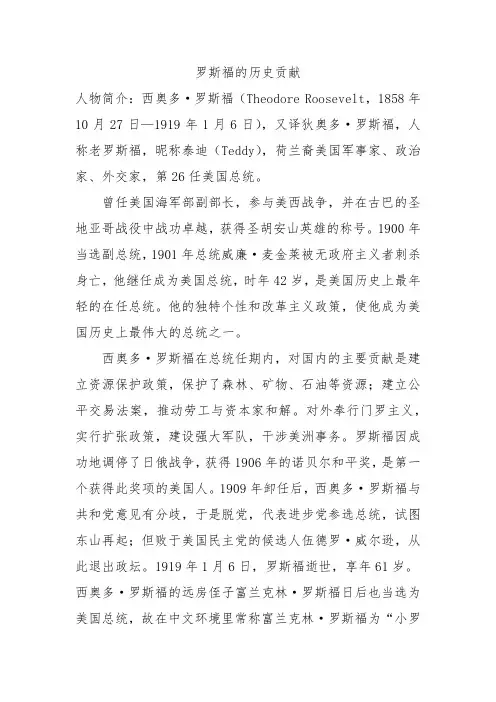
罗斯福的历史贡献人物简介:西奥多·罗斯福(Theodore Roosevelt,1858年10月27日—1919年1月6日),又译狄奥多·罗斯福,人称老罗斯福,昵称泰迪(Teddy),荷兰裔美国军事家、政治家、外交家,第26任美国总统。
曾任美国海军部副部长,参与美西战争,并在古巴的圣地亚哥战役中战功卓越,获得圣胡安山英雄的称号。
1900年当选副总统,1901年总统威廉·麦金莱被无政府主义者刺杀身亡,他继任成为美国总统,时年42岁,是美国历史上最年轻的在任总统。
他的独特个性和改革主义政策,使他成为美国历史上最伟大的总统之一。
西奥多·罗斯福在总统任期内,对国内的主要贡献是建立资源保护政策,保护了森林、矿物、石油等资源;建立公平交易法案,推动劳工与资本家和解。
对外奉行门罗主义,实行扩张政策,建设强大军队,干涉美洲事务。
罗斯福因成功地调停了日俄战争,获得1906年的诺贝尔和平奖,是第一个获得此奖项的美国人。
1909年卸任后,西奥多·罗斯福与共和党意见有分歧,于是脱党,代表进步党参选总统,试图东山再起;但败于美国民主党的候选人伍德罗·威尔逊,从此退出政坛。
1919年1月6日,罗斯福逝世,享年61岁。
西奥多·罗斯福的远房侄子富兰克林·罗斯福日后也当选为美国总统,故在中文环境里常称富兰克林·罗斯福为“小罗斯福”。
2006年6月26日,他再次成为《时代》周刊的封面人物。
西奥多·罗斯福被美国的权威期刊《大西洋月刊》评为影响美国的100位人物第15名。
为政举措扩展联邦:在罗斯福任内,俄克拉何马州加入了联邦。
俄克拉何马包括的印地安保留地曾经试图以Sequoyah州的名义单独加盟。
1906年国会通过的法案裁定俄克拉何马及印地安领地作为一个州加入联邦。
同时,裁定亚利桑那和新墨西哥作为一个州加盟。
但是这部分议案被这两州的人民拒绝。
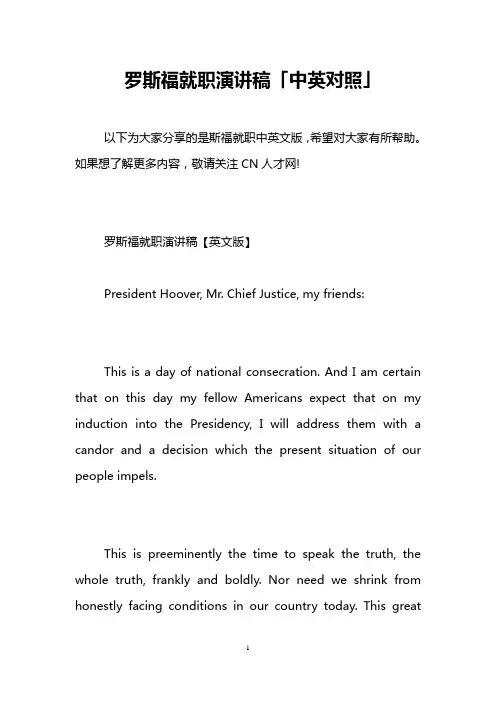
罗斯福就职演讲稿「中英对照」以下为大家分享的是斯福就职中英文版,希望对大家有所帮助。
如果想了解更多内容,敬请关注CN人才网!罗斯福就职演讲稿【英文版】President Hoover, Mr. Chief Justice, my friends:This is a day of national consecration. And I am certain that on this day my fellow Americans expect that on my induction into the Presidency, I will address them with a candor and a decision which the present situation of our people impels.This is preeminently the time to speak the truth, the whole truth, frankly and boldly. Nor need we shrink from honestly facing conditions in our country today. This greatNation will endure, as it has endured, will revive and will prosper.So, first of all, let me assert my firm belief that the only thing we have to fear is fear itself -- nameless, unreasoning, unjustified terror which paralyzes needed efforts to convert retreat into advance. In every dark hour of our national life, a leadership of frankness and of vigor has met with that understanding and support of the people themselves which is essential to victory. And I am convinced that you will again give that support to leadership in these critical days.In such a spirit on my part and on yours we face our common difficulties. They concern, thank God, only material things. Values have shrunk to fantastic levels; taxes have risen; our ability to pay has fallen; government of all kinds is faced by serious curtailment of income; the means of exchange are frozen in the currents of trade; the withered leaves of industrial enterprise lie on every side; farmers find no markets for their produce; and the savings of many years in thousands offamilies are gone. More important, a host of unemployed citizens face the grim problem of existence, and an equally great number toil with little return. Only a foolish optimist can deny the dark realities of the moment.And yet our distress comes from no failure of substance. We are stricken by no plague of locusts. Compared with the perils which our forefathers conquered, because they believed and were not afraid, we have still much to be thankful for. Nature still offers her bounty and human efforts have multiplied it. Plenty is at our doorstep, but a generous use of it languishes in the very sight of the supply.Primarily, this is because the rulers of the exchange of mankind s goods have failed, through their own stubbornness and their own incompetence, have admitted their failure, and have abdicated. Practices of the unscrupulous money changers stand indicted in the court of public opinion, rejected by the hearts and minds of men.True, they have tried. But their efforts have been cast in the pattern of an outworn tradition. Faced by failure of credit, they have proposed only the lending of more money. Stripped of the lure of profit by which to induce our people to follow their false leadership, they have resorted to exhortations, pleading tearfully for restored confidence. They only know the rules of a generation of self-seekers. They have no vision, and when there is no vision the people perish.Yes, the money changers have fled from their high seats in the temple of our civilization. We may now restore that temple to the ancient truths. The measure of that restoration lies in the extent to which we apply social values more noble than mere monetary profit.Happiness lies not in the mere possession of money; it lies in the joy of achievement, in the thrill of creative effort. The joy, the moral stimulation of work no longer must be forgotten in the mad chase of evanescent profits. These darkdays, my friends, will be worth all they cost us if they teach us that our true destiny is not to be ministered unto but to minister to ourselves, to our fellow men.Recognition of that falsity of material wealth as the standard of success goes hand in hand with the abandonment of the false belief that public office and high political position are to be valued only by the standards of pride of place and personal profit; and there must be an end to a conduct in banking and in business which too often has given to a sacred trust the likeness of callous and selfish wrongdoing. Small wonder that confidence languishes, for it thrives only on honesty, on honor, on the sacredness of obligations, on faithful protection, and on unselfish performance; without them it cannot live.Restoration calls, however, not for changes in ethics alone. This Nation is asking for action, and action now.Our greatest primary task is to put people to work. This is no unsolvable problem if we face it wisely and courageously. It can be accomplished in part by direct recruiting by the Government itself, treating the task as we would treat the emergency of a war, but at the same time, through this employment, accomplishing great -- greatly needed projects to stimulate and reorganize the use of our great natural resources.Hand in hand with that we must frankly recognize the overbalance of population in our industrial centers and, by engaging on a national scale in a redistribution, endeavor to provide a better use of the land for those best fitted for the land.Yes, the task can be helped by definite efforts to raise the values of agricultural products, and with this the power to purchase the output of our cities. It can be helped by preventing realistically the tragedy of the growing loss through foreclosure of our small homes and our farms. It canbe helped by insistence that the Federal, the State, and the local governments act forthwith on the demand that their cost be drastically reduced. It can be helped by the unifying of relief activities which today are often scattered, uneconomical, unequal. It can be helped by national planning for and supervision of all forms of transportation and of communications and other utilities that have a definitely public character. There are many ways in which it can be helped, but it can never be helped by merely talking about it.We must act. We must act quickly.And finally, in our progress towards a resumption of work, we require two safeguards against a return of the evils of the old order. There must be a strict supervision of all banking and credits and investments. There must be an end to speculation with other people s money. And there must be provision for an adequate but sound currency.These, my friends, are the lines of attack. I shall presently urge upon a new Congress in special session detailed measures for their fulfillment, and I shall seek the immediate assistance of the 48 States.Through this program of action we address ourselves to putting our own national house in order and making income balance outgo. Our international trade relations, though vastly important, are in point of time, and necessity, secondary to the establishment of a sound national economy. I favor, as a practical policy, the putting of first things first. I shall spare no effort to restore world trade by international economic readjustment; but the emergency at home cannot wait on that accomplishment.The basic thought that guides these specific means of national recovery is not nationally -- narrowly nationalistic. It is the insistence, as a first consideration, upon the interdependence of the various elements in and parts of the United States of America -- a recognition of the old andpermanently important manifestation of the American spirit of the pioneer. It is the way to recovery. It is the immediate way. It is the strongest assurance that recovery will endure.In the field of world policy, I would dedicate this Nation to the policy of the good neighbor: the neighbor who resolutely respects himself and, because he does so, respects the rights of others; the neighbor who respects his obligations and respects the sanctity of his agreements in and with a world of neighbors.If I read the temper of our people correctly, we now realize, as we have never realized before, our interdependence on each other; that we can not merely take, but we must give as well; that if we are to go forward, we must move as a trained and loyal army willing to sacrifice for the good of a common discipline, because without such discipline no progress can be made, no leadership becomes effective.We are, I know, ready and willing to submit our lives and our property to such discipline, because it makes possible a leadership which aims at the larger good. This, I propose to offer, pledging that the larger purposes will bind upon us, bind upon us all as a sacred obligation with a unity of duty hitherto evoked only in times of armed strife.With this pledge taken, I assume unhesitatingly the leadership of this great army of our people dedicated to a disciplined attack upon our common problems.Action in this image, action to this end is feasible under the form of government which we have inherited from our ancestors. Our Constitution is so simple, so practical that it is possible always to meet extraordinary needs by changes in emphasis and arrangement without loss of essential form. That is why our constitutional system has proved itself the most superbly enduring political mechanism the modern world has ever seen.It has met every stress of vast expansion of territory, of foreign wars, of bitter internal strife, of world relations. And it is to be hoped that the normal balance of executive and legislative authority may be wholly equal, wholly adequate to meet the unprecedented task before us. But it may be that an unprecedented demand and need for undelayed action may call for temporary departure from that normal balance of public procedure.I am prepared under my constitutional duty to recommend the measures that a stricken nation in the midst of a stricken world may require. These measures, or such other measures as the Congress may build out of its experience and wisdom, I shall seek, within my constitutional authority, to bring to speedy adoption.But, in the event that the Congress shall fail to take one of these two courses, in the event that the national emergency is still critical, I shall not evade the clear course of duty that willthen confront me. I shall ask the Congress for the one remaining instrument to meet the crisis -- broad Executive power to wage a war against the emergency, as great as the power that would be given to me if we were in fact invaded by a foreign foe.For the trust reposed in me, I will return the courage and the devotion that befit the time. I can do no less.We face the arduous days that lie before us in the warm courage of national unity; with the clear consciousness of seeking old and precious moral values; with the clean satisfaction that comes from the stern performance of duty by old and young alike. We aim at the assurance of a rounded, a permanent national life.We do not distrust the -- the future of essential democracy. The people of the United States have not failed. In their need they have registered a mandate that they wantdirect, vigorous action. They have asked for discipline and direction under leadership. They have made me the present instrument of their wishes. In the spirit of the gift I take it.In this dedication -- In this dedication of a Nation, we humbly ask the blessing of God.May He protect each and every one of us.May He guide me in the days to come.罗斯福就职演讲稿【中文版】胡佛总统,首席法官先生,朋友们:今天,对我们的国家来说,是一个神圣的日子。
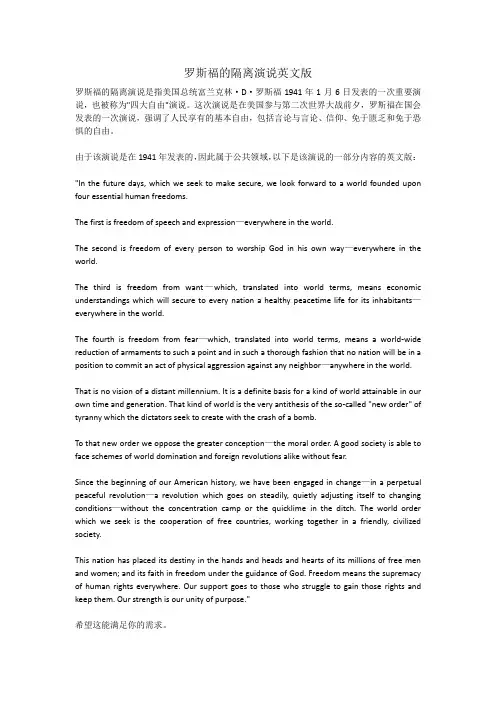
罗斯福的隔离演说英文版罗斯福的隔离演说是指美国总统富兰克林·D·罗斯福1941年1月6日发表的一次重要演说,也被称为"四大自由"演说。
这次演说是在美国参与第二次世界大战前夕,罗斯福在国会发表的一次演说,强调了人民享有的基本自由,包括言论与言论、信仰、免于匮乏和免于恐惧的自由。
由于该演说是在1941年发表的,因此属于公共领域,以下是该演说的一部分内容的英文版:"In the future days, which we seek to make secure, we look forward to a world founded upon four essential human freedoms.The first is freedom of speech and expression—everywhere in the world.The second is freedom of every person to worship God in his own way—everywhere in the world.The third is freedom from want—which, translated into world terms, means economic understandings which will secure to every nation a healthy peacetime life for its inhabitants—everywhere in the world.The fourth is freedom from fear—which, translated into world terms, means a world-wide reduction of armaments to such a point and in such a thorough fashion that no nation will be in a position to commit an act of physical aggression against any neighbor—anywhere in the world.That is no vision of a distant millennium. It is a definite basis for a kind of world attainable in our own time and generation. That kind of world is the very antithesis of the so-called "new order" of tyranny which the dictators seek to create with the crash of a bomb.To that new order we oppose the greater conception—the moral order. A good society is able to face schemes of world domination and foreign revolutions alike without fear.Since the beginning of our American history, we have been engaged in change—in a perpetual peaceful revolution—a revolution which goes on steadily, quietly adjusting itself to changing conditions—without the concentration camp or the quicklime in the ditch. The world order which we seek is the cooperation of free countries, working together in a friendly, civilized society.This nation has placed its destiny in the hands and heads and hearts of its millions of free men and women; and its faith in freedom under the guidance of God. Freedom means the supremacy of human rights everywhere. Our support goes to those who struggle to gain those rights and keep them. Our strength is our unity of purpose."希望这能满足你的需求。
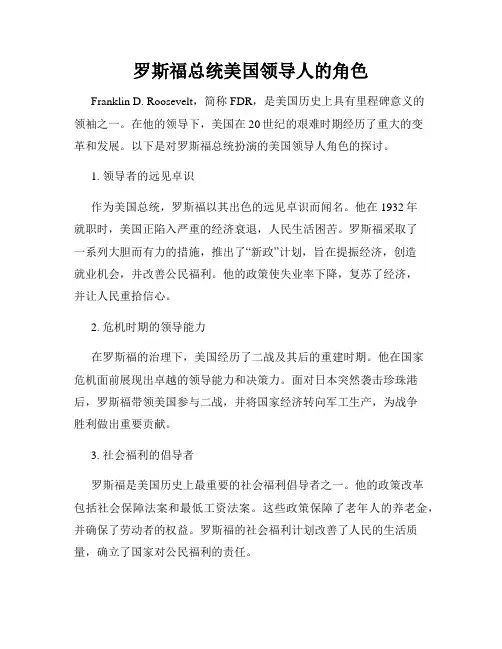
罗斯福总统美国领导人的角色Franklin D. Roosevelt,简称FDR,是美国历史上具有里程碑意义的领袖之一。
在他的领导下,美国在20世纪的艰难时期经历了重大的变革和发展。
以下是对罗斯福总统扮演的美国领导人角色的探讨。
1. 领导者的远见卓识作为美国总统,罗斯福以其出色的远见卓识而闻名。
他在1932年就职时,美国正陷入严重的经济衰退,人民生活困苦。
罗斯福采取了一系列大胆而有力的措施,推出了“新政”计划,旨在提振经济,创造就业机会,并改善公民福利。
他的政策使失业率下降,复苏了经济,并让人民重拾信心。
2. 危机时期的领导能力在罗斯福的治理下,美国经历了二战及其后的重建时期。
他在国家危机面前展现出卓越的领导能力和决策力。
面对日本突然袭击珍珠港后,罗斯福带领美国参与二战,并将国家经济转向军工生产,为战争胜利做出重要贡献。
3. 社会福利的倡导者罗斯福是美国历史上最重要的社会福利倡导者之一。
他的政策改革包括社会保障法案和最低工资法案。
这些政策保障了老年人的养老金,并确保了劳动者的权益。
罗斯福的社会福利计划改善了人民的生活质量,确立了国家对公民福利的责任。
4. 全球领导者的地位罗斯福是二战期间的重要战略指导者,也是盟军的领袖。
他与斯大林和丘吉尔等世界领导人密切合作,确保盟国在战争中的胜利。
罗斯福的外交政策致力于建设一个安全而稳定的全球秩序,为战后世界做出了卓越贡献。
5. 唤起国家的荣誉感和自豪感罗斯福以其鼓舞人心的演讲和领导能力,唤起了美国人民的荣誉感和自豪感。
他的“四大自由”演讲激发了国民对自由和民主的向往,鼓励了美国人民参与战争,并为未来的国家进步奠定了基础。
总之,罗斯福以其杰出的领导才能,在美国历史上扮演了一个重要的角色。
他的远见卓识和领导能力使美国从危机中崛起,重建了国家,并为国家的福利和全球和平做出了巨大贡献。
他的领导地位和政策对今天的美国仍然具有深远的影响。
英语故事Franklin Delano Roosevelt富兰克林·德拉诺·罗斯福美国历史上唯一蝉联四届(第四届未任满)的总统。
罗斯福在20世纪的经济大萧条和第二次世界大战中扮演了重要的角色。
被学者评为是美国最伟大的三位总统之一。
Franklin Delano RooseveltFranklin Delano Roosevelt (January 30, 1882 – April 12, 1945) was the 32nd president of the United States and a central figure in world events during the mid-20th century, leading the United States during a time of worldwide economic crisis and world war. The only American president elected to more than two terms (he was elected to four but only served three full terms, dying in his fourth term), he was often referred to by his initials, Franklin Delano Roosevelt. Roosevelt won his first of four presidential elections in 1932, while the UnitedStates was in the depths of the great depression. Franklin Delano Roosevelt’s combination of optimism and economic activism is often credited with keeping the country’s economic crisis from developing into a political crisis. he led the United States through most of world war ii, and died in office of a cerebral hemorrhage shortly before the war ended.In his first term (1933–37) Franklin Delano Roosevelt launched the new deal, a very large, complex interlocking set of programs designed to produce relief (especially government jobs for the unemployed), recovery (of the economy), and reform (by which he meant regulation of wall street, banks and transportation). The conservative coalition that formed in 1937 prevented his packing the Supreme Court or passing much new legislation; it abolished most of the relief programs when unemployment practically ended during World War II. Most of the regulations on business were ended about 1975-85, except for the regulation of Wall Street by the Securities and Exchange Commission, which still exists. The major survivinggeneral welfare clause program is social security (United States), which congress passed in 1935.As World War II loomed after 1938, with the Japanese invasion of china and the aggressions of Nazi Germany, Franklin Delano Roosevelt gave strong diplomatic and financial support to china and Britain, while remaining officially neutral. His goal was to make America the “arsenal of democracy”--supplying the munitions while others did the fighting. In March 1941, Roosevelt, with congressional approval, provided lend-lease aid to the countries fighting against Nazi Germany, with Great Britain. he secured a near-unanimous declaration of war against Japan after the Japanese attack on pearl harbor on December 7, 1941, calling it a “date that will live in infamy.” he supervised the mobilization of the us economy to support the allied war effort, taking criticism for fumbles early on, but saw unemployment evaporate and the industrial economy soar to heights no one ever expected. Roosevelt dominated the American political scene, not only during the twelve years of his presidency, butfor decades afterward. He orchestrated the realignment of voters that created the fifth party system. Franklin Delano Roosevelt’s new deal coalition united together labor unions, big city machines, white ethnics, welfare recipients, African Americans and rural white southerners. Roosevelt’s diplomatic impact also resonated on the world stage long after his death, with the United Nations and Bretton Woods as examples of his administration’s wide-ranging impact. Roosevelt is consistently rated by scholars as one of the greatest U.S. presidents.State senatorIn the state election of 1910, Roosevelt ran for the New York state senate from the district around Hyde Park in Dutchess County, which had not elected a democrat since 1884. he entered the Roosevelt name, with its associated wealth, prestige, and influence in the Hudson valley, and thedemocratic landslide that year carried him to the state capital Albany. Roosevelt took his seat on January 1, 1911. He became the leader of a group of “insurgents”who opposed the Tammany machine which dominated the state democratic party. The U.S. senate election which began with the democratic caucus on January 16, 1911, was deadlocked by the struggle of the two factions for 74 days. On March 31, James A. O’Gorman was elected, and Roosevelt had achieved his goal: to upset the Tammany machine by blocking their choice William F. Sheehan. Roosevelt soon became a popular figure among New York democrats. he was re-elected for a second term in the state election of 1912, but resigned from the New York state senate on march 17, 1913, to accept his appointment as assistant U.S. secretary of the navy.Assistant secretary of the navyFranklin Delano Roosevelt as assistant secretary for thenavy. Franklin d. Roosevelt was appointed assistant secretary of the navy by Woodrow Wilson in 1913. He served under secretary of the navy Josephus Daniels. In 1914, he was defeated in the democratic primary election for the United States senate by Tammany hall-backed James W. Gerard. As assistant secretary, Roosevelt worked to expand the navy and founded the United States navy reserve. Wilson sent the navy and marines to intervene in Central American and Caribbean countries. In a series of speeches in his 1920 campaign for vice president, Roosevelt claimed that he, as assistant secretary of the navy, wrote the constitution which the U.S. imposed on Haiti in 1915.Roosevelt developed a life-long affection for the navy. Roosevelt negotiated with congressional leaders and other government departments to get budgets approved. He became an enthusiastic advocate of the submarine and of means to combat the German submarine menace to allied shipping: he proposed building a mine barrier across the North Sea from Norway to Scotland. In 1918, he visited Britain and France to inspect American naval facilities; during this visit he met WinstonChurchill for the first time. With the end of World War I in November 1918, he was in charge of demobilization, although he opposed plans to completely dismantle the navy. In July 1920, overshadowed by the Newport sex scandal and its coverage in the providence journal and New York Times, Roosevelt resigned as assistant secretary of the navy to run for vice president.1932 Presidential ElectionRoosevelt’s strong base in the most populous state made him an obvious candidate for the democratic nomination, which was hotly contested since it seemed that incumbent Herbert Hoover would be vulnerable in the 1932 election. al smith was supported by some city bosses, but had lost control of the New York democratic party to Roosevelt. Roosevelt built his own national coalition with personal allies such as newspaper magnate William Randolph Hearst, Irish leader Joseph P. Kennedy, Sr., and California leader William Gibbs McAdoo. WhenTexas leader John Nance garners switched to Franklin Delano Roosevelt, he was given the presidential nomination.The election campaign was conducted under the shadow of the great depression in the United States, and the new alliances which it created. Roosevelt and the Democratic Party mobilized the expanded ranks of the poor as well as organized labor, ethnic minorities, urbanites, and southern whites, crafting the new deal coalition. during the campaign, Roosevelt said: “I pledge you, I pledge myself, to a new deal for the American people”, coining a slogan that was later adopted for his legislative program as well as his new coalition economist marriner eccles observed that “given later developments, the campaign speeches often read like a giant misprint, in which Roosevelt and Hoover speak each other’s lines.” Roosevelt denounced Hoover’s failures to restore prosperity or even halt the downward slide, and he ridiculed Hoover’s huge deficits. Roosevelt campaigned on the democratic platform advocating “immediate and drastic reductions of all public expenditures,”“abolishing uselesscommissions and offices, consolidating bureaus and eliminating extravagances reductions in bureaucracy,” and for a “sound currency to be maintained at all hazards.” on September 23, Roosevelt made the gloomy evaluation that, “our industrial plant is built; the problem just now is whether under existing conditions it is not overbuilt. Our last frontier has long since been reached.” Hoover damned that pessimism as a denial of “the promise of American life… The counsel of despair.”the prohibition issue solidified the wet vote for Roosevelt, who noted that repeal would bring in new tax revenues. Roosevelt won 57% of the vote and carried all but six states. historians and political scientists consider the 1932-36 elections a realigning election that created a new majority coalition for the democrats, thus transforming American politics and starting what is called the “new deal party system” or (by political scientists) the fifth party system.After the election, Roosevelt refused Hoover’s requests for a meeting to come up with a joint program to stopthe downward spiral and calm investors, claiming it would tie his hands. the economy spiraled downward until the banking system began a complete nationwide shutdown as Hoover’s term ended. In February 1933, Roosevelt escaped a possible assassination attempt by Giuseppe Zangara (which killed Chicago mayor Anton Cermak sitting next to him). Roosevelt leaned heavily on his “brain trust” of academic advisors, especially Raymond Moley when designing his policies; he offered cabinet positions to numerous candidates (sometimes two at a time), but most declined. The cabinet member with the strongest independent base was Cordell hull at state. William Hartman Woodin at treasury was soon replaced by the much more powerful Henry Morgenthau, Jr.First term, 1933–1937When Roosevelt was inaugurated march 4, 1933 (32 days after Hitler was appointed chancellor of Germany), the U.S.was at the nadir of the worst depression in its history. A quarter of the workforce was unemployed. Farmers were in deep trouble as prices fell by 60%. Industrial production had fallen by more than half since 1929. Two million were homeless. Due to the lack of employment, organized crime and outlaws were on the rise, such as John Dillinger. By the evening of March 4, 32 of the 48 states, as well as the District of Columbia had closed their banks. The New York Federal Reserve Bank was unable to open on the 5th, as huge sums had been withdrawn by panicky customers in previous days. Beginning with his inauguration address, Roosevelt began blaming the economic crisis on bankers and financiers, the quest for profit, and the self-interest basis of capitalism: “Primarily this is because rulers of the exchange of mankind’s goods have failed through their own stubbornness and their own incompetence, have admitted their failure, and have abdicated. Practices of the unscrupulous money changers stand indicted in the court of public opinion, rejected by the hearts and minds of men. True they have tried, but their efforts have been cast in the pattern of an outworn tradition. Faced by failure of credit they have proposed only the lending of more money. stripped of the lure of profit by which to induce our people to followtheir false leadership, they have resorted to exhortations, pleading tearfully for restored confidence... The money changers have fled from their high seats in the temple of our civilization. We may now restore that temple to the ancient truths. The measure of the restoration lies in the extent to which we apply social values more noble than mere monetary profit. “Historians categorized Roosevelt’s program as “relief, recovery and reform.” relief was urgently needed by tens of millions of unemployed. Recovery meant boosting the economy back to normal. Reform meant long-term fixes of what was wrong, especially with the financial and banking systems. Roosevelt’s series of radio talks, known as fireside chats, presented his proposals directly to the American public.。
美国历届总统简介:第26任总统西奥多?罗斯福Theodore "Teddy" Roosevelt was the 26th President of America. He served for two terms between 1901 and 1909. He was born in 1858 in New York City. He was mostly home schooled because of ill health as a child. He graduated from Harvard (where he was a boxing champion) and in 1880 entered law school. He dropped out a year later to enter politics. He is often ranked as the greatest ever U.S. President.西奥多·罗斯福是美国第26任总统,人称“泰迪”。
他的任期为1901-1909,共两届。
1858年,他出生于纽约市。
小时候体弱多病,大部分时间在家中完成学业。
罗斯福毕业于哈佛大学(当时他是学校的拳击冠军),1880年,进入法律学校。
一年之后辍学,并进入政坛。
人们经常认为他是美国最伟大的总统。
During the Spanish-American War, Roosevelt was lieutenant colonel of the Rough Rider Regiment, which he led on a charge at the battle of San Juan. His war-hero status prompted New York Republicans to nominate himas Governor to draw attention away from the state’s scandals. Roosevelt won the election and served with distinction for two years.美西战争期间,罗斯福担任第一志愿骑兵旅的中校,并在圣胡安战役中冲锋陷阵。
走近富兰克林·罗斯福7Fascinating Facts About Franklin D.RooseveltFrom the Great Depression注1to World War II,President Franklin D. Roosevelt guided the United States through challenging times.He sought tohelp the American people in many different ways,including creating social safety nets for the elderly and the unemployed.In1935,FDR注2signed the Social Security Act注3to provide aid to the countrys most senior citizens and others in need.FDR considered the Social Security Act to be one of his greatest accomplishments.In a1934speech to Congress[国会],he said“I place the security of the men,women and children of the Nation first.”FDR believed that“the American people deserved some safeguard[保护措施]against misfortunes which cannot be wholly eliminated[消除]in this man-made world of ours.”He accomplished this goal with the creation of Social Security.Lets learn more about the man behind these impressive achievements.从经济大萧条到第二次世界大战,美国总统富兰克林·罗斯福带领着整个美国度过了一段极具挑战性的日子。